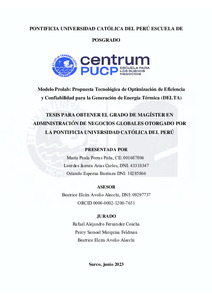| dc.contributor.advisor | Avolio Alecchi, Beatrice Elcira | |
| dc.contributor.author | Porras Peña, María Paula | |
| dc.contributor.author | Arias Carlos, Lourdes Jasmín | |
| dc.contributor.author | Espezua Bustinza, Orlando | |
| dc.date.accessioned | 2023-10-26T16:31:07Z | |
| dc.date.available | 2023-10-26T16:31:07Z | |
| dc.date.created | 2023 | |
| dc.date.issued | 2023-10-26 | |
| dc.identifier.uri | http://hdl.handle.net/20.500.12404/26241 | |
| dc.description.abstract | En las entrevistas realizadas a los clientes del sector industrial, que trabajan
directamente con sistemas de combustión (quemadores) en sus diferentes procesos,
afirmaron que los principales inconvenientes que se presentan referente a la generación
de energía térmica están ligados con problemas de: confiabilidad (originando paradas
intempestivas), eficiencia (terminan consumiendo más combustible para producir lo
mismo), y responsabilidad con el medio ambiente (inquemados, emisiones no
controladas).
Con esta información, se identificó la oportunidad de mejora considerando las
metodologías ágiles, con apoyo en la transformación digital e integración del
conocimiento teórico del MBA para ofrecer una solución atractiva y rentable. Se realizó
un diseño con una propuesta integral, que involucra tres aspectos: (a) tecnología de punta
para optimizar el control de los sistemas de combustión, (b) apoyo de herramientas de
software para el manejo de la información (Big Data Analytics, IA), y (c) un equipo
humano (Delta) con conocimiento y experiencia para integrar esta solución, brindar
confianza al cliente y hacerla viable (rentable) en el tiempo.
Implementar esta propuesta significa atender la necesidad de un amplio sector de la
industria, aumentando la confiabilidad, optimizando la eficiencia (3% al 15%), y siendo más
responsable con el medio ambiente. Se estima lograr una rentabilidad de más de 20%. De
esta manera se espera contribuir en afianzar sinergias entre el sector industrial
manufacturero, la sociedad en general y el cuidado del medio ambiente, alineados y de
acuerdo con el Plan Estratégico de Desarrollo Nacional, del Perú para el 2050. | es_ES |
| dc.description.abstract | Based on client’s interviews and surveys from the industrial sector, who work directly
with combustion systems (burners) in their different processes, we concluded that the most
notorious drawbacks that arise regarding the generation of thermal energy are mainly linked
to the following problems: Reliability: untimely shutdown, efficiency: increase in fuel
consumption without increasing the thermal energy output, environmental responsibility:
above-the-limit emissions.
With this information, we were able to identify opportunities for improvement based
on agile methodologies, supporting us in the digital transformation and integrating the
theoretical knowledge gained during our MBA studies. These opportunities offer attractive
and profitable solutions. Based on the facts discovered, we designed a comprehensive
proposal, which involves the following three things: (a) state-of-the-art technology to
optimize the control of combustion systems, (b) support of software tools for information
management (Big Data Analytics, IA), (c) creation of a team (Delta) with knowledge and
experience to integrate this solution, provide confidence to the client and make it viable
(profitable) over time.
Implementing these solutions will mean meeting the needs of a broad sector of the
industry, increasing reliability, optimizing efficiency (3% to 15%), and being more
environmentally responsible. By implementing these solutions, we estimate to achieve
profitability of more than 20% compared to previous years. Additionally, we hope to
contribute to strengthening synergies between the manufacturing industrial sector,
environmentalists, and society in general while at the same time aligning our goals in
accordance to Peru’s Strategic Plan for National Development of 2050. | es_ES |
| dc.language.iso | spa | es_ES |
| dc.publisher | Pontificia Universidad Católica del Perú | es_ES |
| dc.rights | info:eu-repo/semantics/openAccess | es_ES |
| dc.rights.uri | http://creativecommons.org/licenses/by-nc-nd/2.5/pe/ | * |
| dc.subject | Administración de proyectos | es_ES |
| dc.subject | Sector Industrial--Perú | es_ES |
| dc.subject | Transformación digital | es_ES |
| dc.title | Modelo prolab: propuesta tecnológica de optimización de eficiencia y confiabilidad para la generación de energía térmica (DELTA) | es_ES |
| dc.type | info:eu-repo/semantics/masterThesis | es_ES |
| thesis.degree.name | Maestro en Administración de Negocios Globales | es_ES |
| thesis.degree.level | Maestría | es_ES |
| thesis.degree.grantor | Pontificia Universidad Católica del Perú. CENTRUM | es_ES |
| thesis.degree.discipline | Administración de Negocios Globales | es_ES |
| renati.advisor.dni | 09297737 | |
| renati.advisor.orcid | https://orcid.org/0000-0002-1200-7651 | es_ES |
| renati.author.cext | 001687806 | |
| renati.author.dni | 43318347 | |
| renati.author.dni | 10285866 | |
| renati.discipline | 413227 | es_ES |
| renati.juror | Fernández Concha, Rafael Alejandro | es_ES |
| renati.juror | Marquina Feldman, Percy Samoel | es_ES |
| renati.juror | Avolio Alecchi, Beatrice Elcira | es_ES |
| renati.level | https://purl.org/pe-repo/renati/level#maestro | es_ES |
| renati.type | https://purl.org/pe-repo/renati/type#tesis | es_ES |
| dc.publisher.country | PE | es_ES |
| dc.subject.ocde | https://purl.org/pe-repo/ocde/ford#5.02.04 | es_ES |







